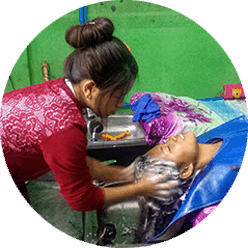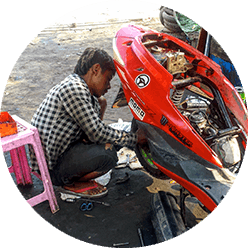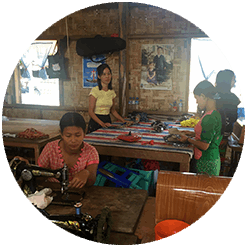Merry Htang Mai is one of thousands of displaced people living in camps in Kachin State in Myanmar. She is not just a displaced person anymore. She has newly become a hairdresser thanks to SOLIDARITÉS INTERNATIONAL training programmes. Like her, Mg Zan Ha, Roi Seng and many others are becoming professionals in various domains, allowing them to live a semblance of their former life.
Currently, more than 100,000 people are internally displaced in Kachin State because of constant conflicts between Burmese armed forces and the army for the independence of Kachin. The violence of the conflicts has forced many of them to flee, leaving everything they owned behind.
Most internally displaced people living in camps in Kachin come from the countryside and do not have any skills to work in urban areas such as where they are staying now. For this reason, SOLIDARITÉS INTERNATIONAL decided to implement a vocational training project in Bhamo. It corresponds to the implementation of trainings in phone repair shops, hair salons, motorbike garages or tailoring shops.
It allows beneficiaries to have long-term job opportunities and a regular income to support their family. Thanks to that, they can achieve sustainable livelihoods and long-term food security.
A few trainees talk about the change to their lives brought about by the programme.
Myanmar
Context and action- 54.4 million inhabitants
- 149th out of 191 countries on the Human Development Index
- 178.000 people helped

Merry Htang Mai is 20 years old and comes from a small village called Mung Ding Pa, in Mansi Township.
“Before, I used to be a student and help my mother in our small family shop. Then, in 2011, there were a lot of fighting around my village, so schools started to close. That is when my family and I decided to flee and arrived in Robert Church camp in Bhamo”.
In February 2017, Merry Htang Mai told us: “I am not yet allowed to cut hair at the salon, but I practice on my brothers and other children in the camp. I would like to continue working at Asia Star beauty salon.”
In November 2017, our teams met Merry Htang Mai again: “I’ve been hired by my trainer, and now I can cut hair. I proved my involvement in the salon, and I was hired at the end of my training. I am the only one of my family to have a regular income, and thanks to that, I can now support my family needs.”

Mg Zan Ha is 19 and lives in Robert Church camp since 2013.
“There was a lot of shelling around my village, Luk Khum in Mansi Township. My family and I were very scared so we decided to flee, and came to Bhamo. Before being displaced, I used to be a student. Now I need to find a way to support my parents and my little brother.”
“I have always had a passion for motorbikes, so when I heard about the training provided by SOLIDARITÉS INTERNATIONAL, I applied immediately. So far, I have learnt to do minor repairs.”
When asked what his favourite part of the training is, he replies, “I really don’t have a favourite activity. I enjoy everything about it. It is great to be able to learn more about something I love and to contribute to my future, while at the same time I can help my family”. He finally shared with us his dream of being able to open his own motorbike garage later on.

Roi Seng, Lu Jar and Nang Mai are 3 of SOLIDARITÉS INTERNATIONAL’s vocational training beneficiaries. They are currently undertaking trainings in a tailoring shop.
Nang Dwe, the shop owner talks about the training programme: “I teach them by showing them, they take notes and then they try by themselves. At this moment, they can make skirts, blouses and coats on their own but knitting is more difficult. I need to teach them more about it.”
When asked about their plans for the future, the girls tell us: “We would like to open a shop together in the camp we are currently living in. When we will be able to return to our village, each of us would like to open her own business.”
This vocational training program, funded by the U.S. Office of Foreign Disaster Assistance (OFDA), gives beneficiaries the opportunity to acquire skills that will enable them to find employment and provide for their families themselves. This allows them to keep their dignity intact. Moreover, this program offers real opportunities for the future of these people, especially for those who would like to open up their own shop once they return to their village.
SUPPORT DISPLACED PEOPLE IN KACHIN
DONATE
© SOLIDARITÉS INTERNATIONAL
